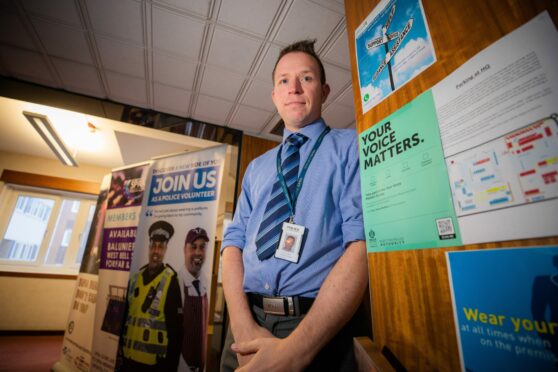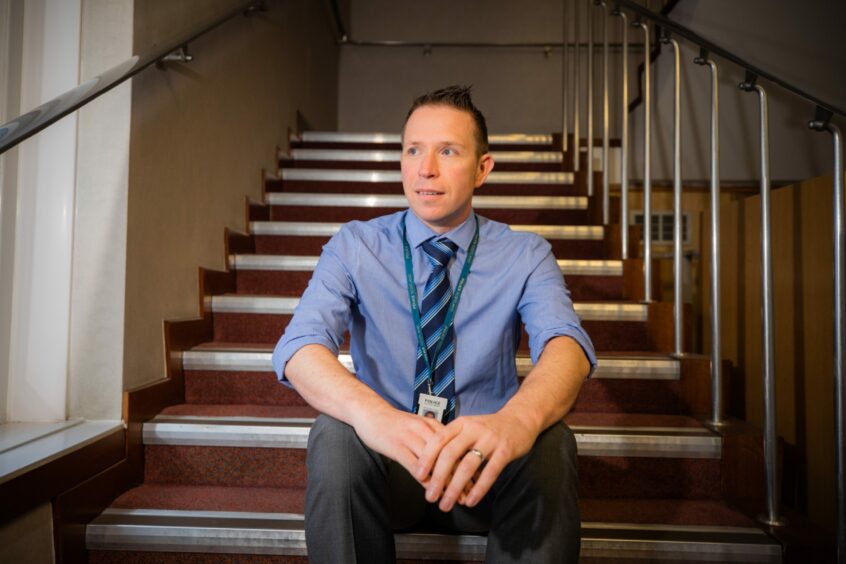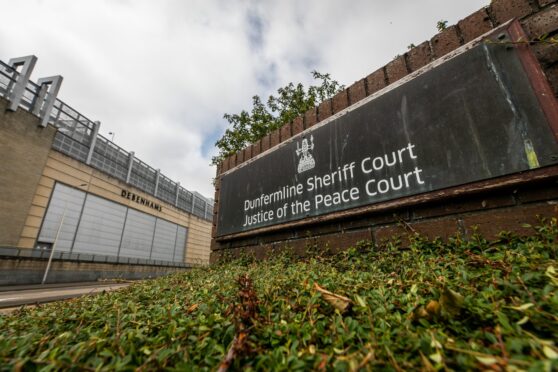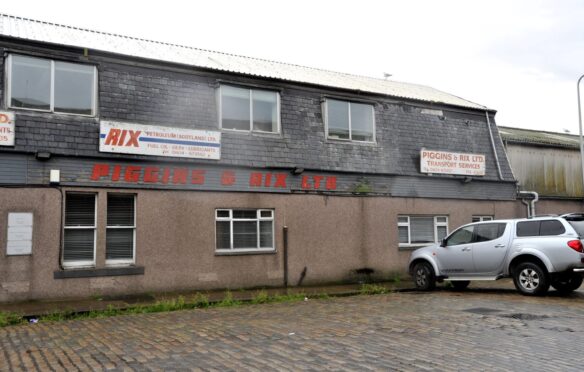A proactive approach by Police Scotland is helping bring domestic abusers to justice, a top officer has stated.
The Courier met with Detective Inspector Gordon Patullo in the wake of the sentencing of serial rapist and domestic abuser Derek Duncan.
Mr Patullo headed the Domestic Abuse Task Force that brought Duncan to justice – with the help of those he abused – after a decade of rape and violence.
With the bravery and strength of the victims, the task force was able to build a case against Duncan over the course of four months.
He will serve a decade in prison for 17 charges of rape, assault and domestic abuse and will be on the Sex Offenders Register for life.
End of reactive domestic abuse policing
DI Patullo sat down with The Courier to speak further on the role of the police in combating domestic abuse and how it is never too late for survivors to come forward.
The Domestic Abuse Task Force is geared towards helping those who have been attacked and abused come forward and support them through the legal process.
It was established by Police Scotland to thoroughly investigate and eradicate domestic abuse.
According to Mr Patullo, the team is a corrective to the traditional way police handled domestic violence.
“We are going to proactively investigate domestic abuse rather than be reactive all of the time.
“The Task Force was set up to target the highest level of offending that has the greatest risk of harm to others.
“The team is trained to understand how and why victims of domestic abuse too often do not report to police.
“Everybody has a different reason why they don’t want to report to the police.
“It can be through fear of the male, if he’s still in their lives, still maintaining some form of contact.
“Where that’s in a relationship there might be barriers in place, peer pressure from the partner’s family, whatever it might be.”
Vital role of Task Force
In the case of Derek Duncan, it was one victim coming forward to police in April 2020 that began the process.
“There was a fear in coming forward as often is in these cases.
“There was a reluctance and that’s where the work of the Task Force comes in because we have the expertise and the skill set.
“We also have the time, whereas uniformed officers don’t have the time to go and spend with these females and interact with them, give them that support and encouragement that they need to come forward.”
The Task Force helped survivors of Duncan’s abuse through the investigative process and court proceedings.
The proactive approach reflects a cultural shift in how police investigate domestic violence.
“Domestic abuse is a force priority now,” said Mr Patullo.
“It’s a priority to investigate and tackle domestic abuse and eradicate it, but ten, 20 years ago that was different.”
Over the years, court proceedings have evolved to help victims of abuse give evidence without having to see their attacker.
“The way the courts deal with things is far better now.
“Ten, 20 years ago a domestic abuse victim or a rape victim would have to stand in the witness dock and the accused could look the accuser in the eye and that’s a huge problem for a lot of people.
“Procedurally, there are measures in place and that doesn’t have to happen – there can be screens split off, evidence can be given in advance.”
“As the police are evolving, the court process evolves too.”
Scrutiny of force is ‘welcome’
In the wake of the death of Sarah Everard, a national spotlight has been shone on police misconduct, institutional sexism and mishandling of violence against women.
Sarah Everard was abducted, raped and murdered by an off-duty police officer in London earlier this year.
Her murderer, Wayne Couzens, used his police credentials to falsely arrest her.
He had previously been jokingly referred to as “the rapist” by his colleagues.
When asked about this type of heightened criticism, Mr Patullo said people should not to be discouraged in trusting the police.
“Nobody hates a bent cop more than a good one because it does tarnish the reputation.
“Was some of the criticism over the top? Possibly.
“You see on social media some of the things that were written following Sarah Everard – ‘all police cant be trusted’ kind of thing.
“That’s clearly not the case.
“This was a guy who committed an abhorrent act and rightfully he’ll not see the light of day again.”
Ultimately, Mr Patullo is understanding about the heightened scrutiny towards the police, as the police are constantly evolving.
“Scrutiny isn’t a bad thing.
“For me its about holding your hands up at times and saying we have got that wrong in the past.
“We do things differently now – not just in domestic abuse – you’re continually learning and developing and moving things on.”
KIRSTY STRICKLAND: 888 tracking app won’t end violence against women
There is advice for those who are suffering or who have suffered, sexual crime at the Police Scotland website here.
Other services such as Scottish Women’s Aid, Rape Crisis Scotland and Victim Support Scotland are also available.












